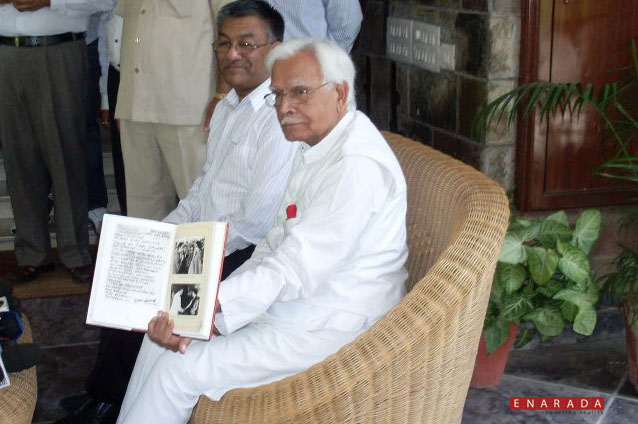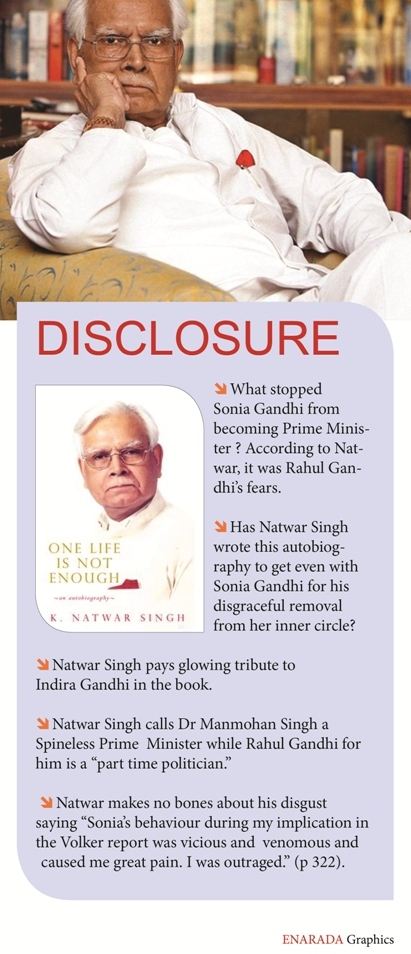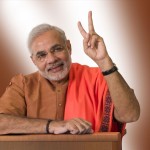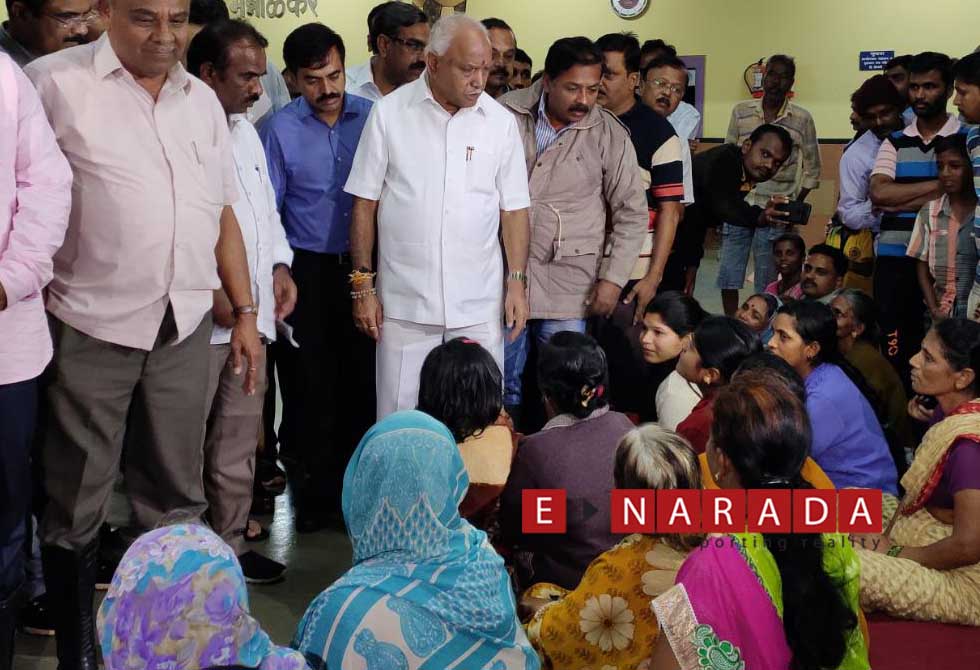ENARADA, New Delhi
By AJAY N JHA
There is a famous saying in Poorvanchal region of India that “a wise and smart Lala never rubs his “Munim” on the wrong side even after his retirement. If at all he does, then it is at own peril.”
Former External Affairs minister K Natwar Singh magnum opus “One life is not Enough- An autobiography” is perhaps one of its best examples. His narration of events and disclosures about the four generations of Nehru Gandhi family has already invited sharp criticism and vitriol from a large number of Congress functionaries including those who had worked with him earlier.
Questions have also been asked if Natwar Singh wrote this autobiography to get even with Sonia Gandhi for his disgraceful removal from her inner circle. Or did he write it to inform the public about its most reclusive political leader who shaped India’s destiny for more than a decade.
However, this book has certainly reminded those high and mighty that they should not underestimate the harm and influence their protégé can cause them when he falls from the group. So, instead of ousting him unceremoniously under whatever influence, he should be eased out smoothly.
Moreover, a political leader who thrives on a culture of sycophancy and has an unapproachable persona, should also know that his/her trusted team consists mostly of self servers whose loyalty ends the moment they are out of power and favour. Whether the jilted person will bite or bark or would be lying low, depends on his power to influence public opinion.
The revelations made by Natwar Singh on the four generations of Nehru- Gandhi family is certainly more pronounced and profound that any of his contemporaries and has pulled and peeled out the veneer of secrecy and is likely to hurt the Congress party more. No wonder then that Congress President Sonia Gandhi was forced to say that She would write her own autobiography to tell her side of the story.
Obviously knives were out in the open the moment the book hit bookstands and one of the congress functionaries termed it as “this kind of betrayal after four generations of proximity for self-promotion and interest could make the best of us cynical and disturbing.” Another Congress functionary termed it as “breach of propriety” adding that Natwar Singh owed his career as a politician solely to the Gandhi family and he should have refrained from hitting below the belt.
Natwar Singh showers praise on Jawaharlal Nehru in the Chapter Once a Nehruite saying Pandit jee wrote superb English and loved the sound of words and phrases(p 108) he admits that “I have been a Nehruite all my life. For decades, I was mesmerized by his courage, his penchant for living dangerously. His stellar role in the freedom movement was second only to that of Gandhi jee, who gave it a spiritual dimension while Nehru provided the intellectual dimension.”
He also mentions how Nehru read vociferously and wrote copiously. He worked for 16 hours day, spent time on matters which could have been dealt by his officials—even mundane matters would attract his attention(P 114)
Yet Natwar Singh does not mind admitting a few widening chink in Nehru’s foreign policy armour. According to Him “Nehru’s three cardinal errors were: His disastrous handling of the Kashmir issue, his misplaced trust of the leaders of the people’s Republic of China and his turning down of Soviet proposal to give India a permanent seat in the United Nations Security Council” (p.111) All three have been milestones around the neck of the people of India and successive governments till 1947.
Natwar Singh pays glowing tribute to Indira Gandhi in the book, listing all those landmarks including NAM and CHOGUM Summit in new Delhi where he had the privilege of her trust and faith.
He is equally effusive in his praise and admiration for Rajiv Gandhi saying “Rajiv came as a fresh air and offered an audacious vision. He made the nation conscious of the 21st century. The atmosphere radiated a mood of confidence and exultation”( p 237).
However Natwar makes no bones about Rajiv’s close Confidants Arun Nehru and Arun Singh and goes on to say “Both had come from the corporate sector. They wielded much power, exceeded their authority and used their influence with thoughtless rigour, without care or caution. Both controlled access to the Prime Minister. Their administrative experience was nil and they were purblind to the complexities and intricacies of governance”(p 238)
However, he does not mind saying that perhaps Rajiv Gandhi had been led into a booby-trap through the signing of Srilanka accord. He also mentions about how MOS defence Arun Singh and Army Chief General K Sundarjee had gone ahead with operation Brass-tacks on the Indo-Pak border without the knowledge of Prime Minister Rajiv Gandhi.
Interestingly, another Gandhi family loyalist, RD Pradhan in his book titled “My years with Rajiv and Sonia does not talk much about those things but makes a rather self- congratulatory statements at a few places.
Natwar Singh calls Dr Manmohan Singh a Spineless Prime Minister while Rahul Gandhi for him is a “part time politician.”
Natwar Singh also gives candid account of what he felt post his removal in a rather disgraceful way despite the Paul Volker report having exonerated him, he writes “Politics is a blood sport where there are no friends at the top. The harassment, the innuendos and the character assassination stopped only a year ago. I was isolated and slandered” (p 358).
However, Natwar Singh’s chapter on Sonia Gandhi is what has been the biggest talking point in both media and political circles since the book hit the stand. One the endorsement Sanjay Baru’s claim in his book titled “The Accidental Prime Minister- The making and unmaking of Manmohan Singh” that Mrs Gandhi had access to government files even as Indian constitution does not authorize any political Party president(even a Kingmaker or the Chairperson of national Advisory Council) to peep into government’s secrets.
The second was his disclosure about what actually stopped Sonia Gandhi from becoming Prime Minister in 2004. According to him, it was neither her ‘inner voice’ that did the trick nor it was the fear of being bullied by multiple allies that forced her to hand over the job to Manmohan Singh. It was neither Sushma Swaraj’s threat to tonsure her head that tilted the balance not it was President APJ Abdul Kalam who advised her against it.
According to Natwar, it was Rahul Gandhi’s fears – that she might be the next one in the family being set up for assassination after his grandmother and his father that made him ask her to reject the job. Mani Shankar agrees that it could have been one of the factors but it certainly was not the only factor.
Actually, Mrs Soni Gandhi’s exact words in that Congress Parliamentary Party meeting were “Throughout these past six years that I have been in politics, one thing has been clear to me. And that is, as I have often stated, that the post of prime minister is not my aim. I was always certain that if ever I found myself in the position that I am in today, I would follow my own inner voice. Today, that voice tells me I must humbly decline this post….Power in itself has never attracted me, nor has position been my goal.”
This makes it sound that her decision was her own, nothing to do with Rahul. Interestingly, former President APJ Kalam in his book titled “Turning Points: A Journey Through Challenges”, writes: “I was told that Sonia Gandhi was meeting me at 12.15 in the afternoon of 18 May. She came in time but instead of coming alone she came with Dr Manmohan Singh and had a discussion with me. She said that she had the requisite numbers but she did not bring the letter of support signed by party functionaries. She would come with the letters of support on the 19th, she said. I asked her why do you postpone? We can even finish it this afternoon. She went away. Later I received a message that she would meet me in the evening, at 8.15 pm.”
Why didn’t she tell him then that she may decline the job? She said she had the numbers.
But Sonia’s meeting appears to have set the dovecotes aflutter. This is what Kalam writes about them: “While this communication was in progress, I had a number of emails and letters coming from individuals, organisations and parties that I should not allow Mrs Sonia Gandhi to become the Prime Minister of our country. I had passed on these mails and letters to various agencies in the government for their information without making any remarks. During this time there were many political leaders who came to meet me to request me not to succumb to any pressure and appoint Mrs Gandhi as the Prime Minister, a request that would not have been constitutionally tenable. “If she had made any claim for herself I would have had no option but to appoint her.”
However, the odd line in Kalam’s statement is when he says “if she had made any claim for herself, I would have had no option but to appoint her.”
Was he not happy to appoint her otherwise? Why did he say he had “no option” as though he would have been happy to have had another option? And did he share any of the communications that urged him to prevent her from swearing her in? Instead, he says “passed on these mails and letters to various agencies in the government”.
What transpired between Kalam and her (and Manmohan) will stay in the realm of speculation, but clearly she could not have been unaware of the issues that might come up if she became PM. As an Italian-born PM, her vulnerability would have been greater than Manmohan Singh’s.
Then there are the real eye-openers in Natwar Singh’s book describing her. Among the words he uses to describe her are “authoritarian”, “capricious” “Machiavellian” and “secretive”.
Natwar makes no bones about his disgust saying “Sonia’s behaviour during my implication in the Volker report was vicious and venomous and caused me great pain. I was outraged” (p 322).
In page no 324 Natwar Singh says that Sonia Gandhi “evolved over the years from being a diffident, nervous, shy woman to being ambitious, authoritarian and stern leader.”
In page no 323 he writes “Sonia’s public image is not very flattering. To an extent, She has to blame herself for it. She never lets her guard down, never gives away what is in her mind, Obsessively secretive and suspicious, She evokes awe and no admiration.”
Then Nattwar Singh goes on to describe her in page no 324 “her displeasure strikes fear among Congressmen. No one has been Congress President for 15 years. Her control on the Congress party is total. Silence is used as a weapon and every subtle gesture is a message, an icy stare a warning. Even opposition parties handle her with kid gloves. Her capriciousness is louded. A fine-tuned personality cult is promoted.
The last line of his description about Sonia Gandhi says “politics has coarsened her.”
This is in sharp contrast to what Rahul Gandhi himself had to say about his mother’s attitude to power in 2013, when he was anointed Vice-President of the Congress party. Soon after the announcement, she apparently went to his room and cried. “My mother came to my room and cried… because she understands that power is poison.”
There is no straight answer to the question if Sonia Gandhi wanted power or not. Both she and Rahul Gandhi would like us to believe she didn’t, but the preponderance of evidence – Sanjaya Baru’s book, The Accidental Prime Minister, and now Natwar Singh’s – suggest that she did wield enormous power, but she chose not to seek it directly. Baru makes it absolutely clear that Sonia was the only power centre, and Natwar Singh even tells us she was “authoritarian.”
Whatever the case may be, there is no doubt that Natwar Singh’s book has forced open many tightly guarded secrets about her personality and that would be a topic of intense debate in many circles for some time. But it has already done irreparable damage to the future of Congress party and would perhaps, consign it into the dustbin of India’s political history if Sonia Gandhi does not understand the gravity of the situation and rises a Sphinx to resurrect it again into a Commissar. !!
Interestingly, a word sympathy and appreciation for Natwar has come from his onetime Junior IFS colleague, Mani Shankar Aiyar writing in Outlook magazine of 11 August 2014 issue says “When the axe fell on him over the Volker report, Natwar was convinced that the American had done him in. he warned me that the next to go would be me and that happened. ”
Mani Shankar goes on to write that ”I am unconvinced that such an honourable and decent human being as Natwar was really caught with his hand in the till. Yes, there was indiscretion and perhaps a helping hand that should not have been there. But defalcation ? Sounds incredible. And if UPA minister could be rehabilitated after a period of vanvas, why was no so able a minister as Natwar NOT given a second chance ?? For, I remain convinced that,, at heart, Natwar is a good guy. I hope he finds his resurrection.”
Those who have known Natwar Singh for so long vouch what would he ask now at the Age of 83 years? But then, through his autobiography, he has taken his sweet revenge in his own inimitable and diplomatic way for sure and that too through a book which would have stack value for the future generations. Through such disclosures, he appears to have taken the revenge of a life time. !!!!
(Posted on August 6, 2014 @ 9:30pm)
(Ajay N Jha is a veteran journalist from both Print and Electronic media. He is an Advisor to Prasar Bharti. The views expressed are his personal. He can be reached at ajayjha30@gmail.com )
The views expressed on the website are those of the Columnists/ Authors/Journalists / Correspondents and do not necessarily reflect the views of ENARADA.







